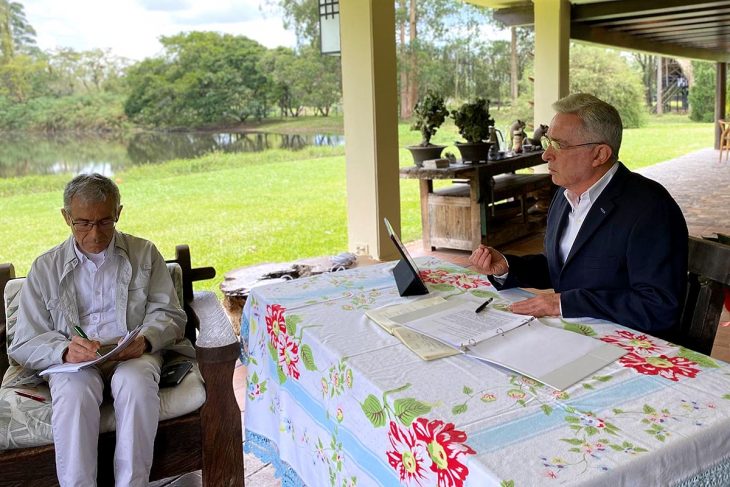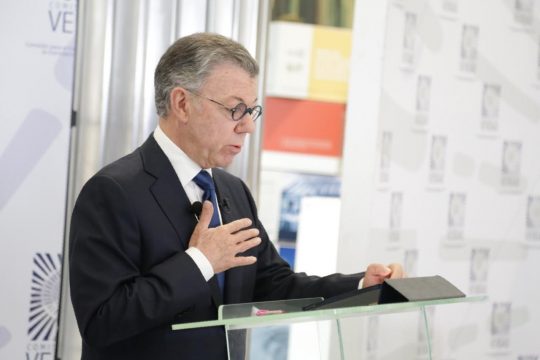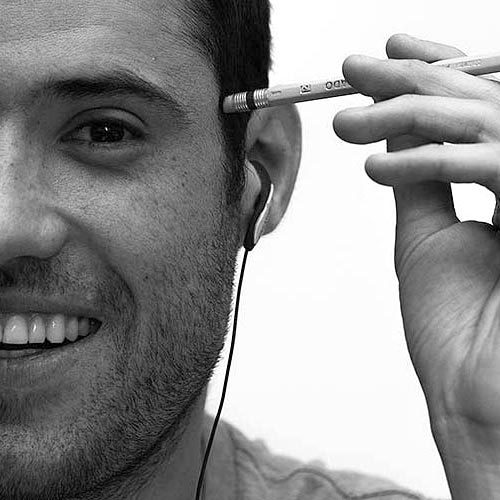Five ‘presidential conversations’, including a chaotic one with its most formidable critic. This was a momentous achievement for Colombia’s Truth and Reconciliation Commission (TRC), the institution tasked with truth-finding, just a few months before the end of its three-year term this November and the unveiling of its final report.
Especially significant but telling was its turbulent meeting, on the 16th of August, with Alvaro Uribe. The twice elected president (2002-2010) who spearheaded opposition against the 2016 peace deal with the Revolutionary Armed Forces of Colombia (FARC) guerrilla, and who still does not recognise the transitional justice system stemming from it. Again, this time, he stressed this at least three times during almost four hours of conversation.
On the terrace of Uribe’s country house
Only three months before the end of the TRC’s mandate and after months of attempts, Uribe finally acquiesced to sit down with three commissioners to discuss aspects of his administration. It was a reversal for someone who in the past described its commissioners as biased, “cheerleaders of human lefts” and even pro-FARC.
Although his predecessors César Gaviria (1990-1994) and Ernesto Samper (1994-1998) had already spoken to the TRC over the past two years, it was probably another interview which ended up nudging Uribe. Two months ago, Juan Manuel Santos (2010-2018) – his defence minister and chosen heir turned into political nemesis - appeared before the TRC, asked victims of extrajudicial executions carried out by army officers for their forgiveness and detailed the corrective measures he took as top security sector leader.
Just like Andrés Pastrana (1998-2002) three days ago, Santos first read his prepared remarks from a lectern, surrounded by banners with the TRC’s logo, and then sat down to discuss additional queries raised by TRC chairman Father Francisco de Roux.
Instead, Uribe asked the TRC to come to his home turf for what was initially meant to be recorded and released later on, but ended up being live-streamed. They sat down on the terrace of Uribe’s country house on the outskirts of his native Medellín, overlooking a lawn where his grandchildren were occasionally seen speeding across the screen, with horses’ neighing and dogs’ barking heard in the background.
Uribe’s truth
Despite the pastoral setting, the conversation was anything but idyllic. During its first hour and a half, Uribe shared with the TRC his vision of Colombia’s recent history, criss-crossing from one issue to another and always referring to the 62-point agenda that he had submitted to the commission.
Some of his comments were personal, like when he described his pain after hearing that his father, cattle rancher Alberto Uribe, had been murdered by FARC rebels during a kidnapping attempt in their farm in 1983. Or when he related having escaped a kidnapping attempt by the People’s Liberation Army (EPL) guerrilla in 1988.
The rest of the time, Uribe defended his administration. He explained that he chose his running mate Francisco Santos, a journalist and anti-kidnapping advocate, because of his standing in human rights circles. He contended that under his watch Colombia volunteered to become the first country whose record was examined by the UN Human Rights Council. He touted his government’s success in curbing homicides, kidnappings and even lesser known crimes such as oil theft. He reminded the TRC of his successful negotiation with paramilitary groups, of his efforts to liberate FARC’s kidnapped victims and, in general, of the sorry state of affairs the country was in when he was elected in 2002.
He also harked back to his time as lawmaker and governor of Antioquia in the 1980s and 1990s, defending his whistle-blower rewards as an effective security sector policy, his peace facilitation commission and his protection of left-wing regional politicians at a time when their party, the Patriotic Union, was being exterminated.
And he stressed some traits of his character. He name-checked seven former rebels who worked with him after abandoning the armed struggle, as proof of his commitment to reconciliation. In general, he showed few misgivings about his time in office, only expressing regret about having posited that civilian informants should be provided guns and having dismissed “false positive” victims.
A tense exchange
After Uribe’s presentation, the three TRC commissioners took turns to ask him why it took so long for the Colombian state to dismantle illegal links between paramilitary groups and segments of the army, or why so many men in arms persisted even after successful negotiations with thousands of paramilitaries and guerrillas.
These were broader queries they hoped would lead to reflections on the contexts that enabled many crimes to flourish. At every attempt, Uribe tersely interrupted them and responded in his characteristic piecemeal style, breaking questions down into snippets about specific events and largely avoiding the bigger picture.
Uribe stressed that he respected Father de Roux as a person and a priest, but considered the TRC and the rest of the transitional justice system illegitimate. He doubled down on his claim that Colombia never suffered an internal armed conflict, but a terrorist threat fuelled by drug trafficking. He expressed his soreness over being labelled a paramilitary by critics and decried political stigmatisation in Colombia – while using heavy-handed language to speak of human rights NGOs that “use human rights as masks” and suggesting that one indigenous organisation has links to the drug trade. “You’ve been biased all your life”, Uribe told commissioner Lucía González, a former museum director, fellow Medellín native and friend of his wife, at one point.
During one particularly tense exchange, Uribe interpreted the commissioners’ questions as an attack against him. “I see you judging, rather than listening and clarifying,” he told them. “This is not an accusation. Help us as Colombians understand so that this may never happen again,” De Roux tried to calm him, as a flock of thick-knees squawked loudly in the background. “Instead of seeing it as something adversarial, you could say ‘I’m going to contribute to the clarification of everything that occurred’ so we may all understand”.
Uribe on false positives
Tension kept building up. It finally exploded when they touched upon the thorniest issue: civilians murdered by military officials between 2002 and 2008 and unlawfully passed off as rebels killed in combat, a tragedy that became euphemistically known as ‘false positives’. The Special Jurisdiction for Peace (JEP), the judicial arm of the transitional justice system, recently established that 6.402 such homicides occurred during Uribe’s period and deemed them as war crimes and crimes against humanity in its first indictments against army officers.
Uribe contended that his government acted as soon as the first complaints emerged, insisting that body counts were never an army policy, and that successful military operatives like the one that rescued presidential candidate Ingrid Betancourt without firing a shot proved this. He denied that pressure from above helps explain why false positives spiked across the country, as the JEP established. It is the fault, he stated, “of the criminally incapable who commit crimes to fake results”. “I demanded results with accountability and respect for human rights”, he insisted.
The former president listed a number of corrective measures dating back to 2005 – although the brunt of them matched the decisions between 2007 and 2008 that finally led to a 92% drop in these crimes, as detailed two months earlier by his erstwhile cabinet member Santos – whose name Uribe didn’t mention even once. The commissioners’ questions on why corrective actions took so long incensed Uribe, who hinted the TRC had chosen to believe his successor. “These processes took time”, he replied. When the TRC chairman said he never mentioned Santos, Uribe snapped back: “You don’t have to Father, it’s enough with saying that things were solved in 2008”.
As De Roux tried, once more, to centre the conversation on the contexts that enabled extrajudicial executions to take place, Uribe’s eldest son interjected from behind the camera. “Santos was treated like a king!”, Tomás Uribe shouted three times, before clashing with Lucía González over a 2017 tweet, in which she celebrated FARC renouncing violence and becoming a political party. This quickly became what national media outlets chose as the headline of the entire conversation.
Many of the more interesting moments faded into oblivion, such as when commissioner Leyner Palacios asked Uribe to embrace the TRC’s future recommendations for the sake of impoverished communities like his. “I hope you commit to them not because of what has happened, but what may continue happening. As political leaders, you must rethink yourselves and avoid remaining anchored in your positions, because this is leading to a prolongation of war”, the Afro-Colombian leader and survivor of one of FARC’s most infamous massacres told him, as Uribe listened attentively.
“This country will need a general amnesty”
Towards the end, Uribe tried to explain his opposition to the 2016 peace deal, to the transitional justice and to non-prison sentences for serious crimes that he considers as nothing short of impunity.
“This country will need a general amnesty, almost a clean slate”, he reflected, arguing that youngsters cannot understand why the theft of a bicycle can lead to a prison sentence while several former FARC rebels are lawmakers in Congress. Army officers should be judged in a different tribunal than the JEP to avoid their equation with former guerrillas, Uribe added, echoing an idea he has long championed.
In the ensuing days, the former president unveiled a more detailed plan for his party to present in Congress. In a mishmash of proposals, he offered to extend legal benefits to those convicted for ordinary crimes, to lift restrictions on those barred from public service and to open the doors of transitional justice to former paramilitaries who are now part of organised crime rings. Uribe, probably aware that this would not meet national and international justice standards, backtracked on calling it a general amnesty and on including mass atrocities, now dubbing it a bill to “overcome legal asymmetries”, to “curb FARC’s privileges”.
It’s not the first time Uribe flirts with the idea of a general amnesty. In October 2018, soon after his protégé Iván Duque became president, the then senator tried to obtain support for a reform of the transitional justice that would free state agents who had been in prison for five years, without having to tell the truth or acknowledge their responsibility. When someone replied that he’d have to extend the same legal benefits to the FARC, he agreed. But ultimately the deal fell through, after fellow senator and former FARC member Carlos Antonio Lozada told him they preferred to stick to the peace deal.
In the end, even if the Uribe interview made headlines for the wrong reasons and the former president insisted that the commission is illegitimate, getting him to sit down brought the TRC one step closer to its goal of listening to all sectors of Colombian society.








